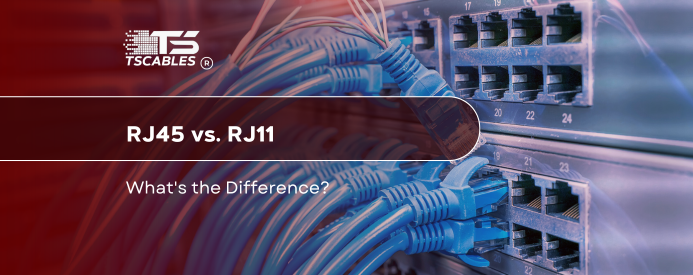Ever looked at two cables and wondered, “RJ11 vs RJ45, which one do I use?” You’re not alone. These little connectors may look similar, but they have completely different jobs. One’s for the internet, the other’s for your phone. Simple, right? Well, not always.
If you’ve ever messed up plugging one into the wrong port, you know how annoying it can be. That’s why we’re breaking it down so it makes it easy for you. This guide will show you what’s what, how each works, and when to use RJ45 or RJ11 cables without any confusing terms or fluff. Let’s plug into it!
What’s the Difference Between RJ45 and RJ11?
You’ve probably seen both around. RJ11 and RJ45 are two types of connectors. They look a bit alike, but they’re built for very different things. Here is the key difference between the two of them:
- RJ45: This one is used for your internet connection. It’s used with Ethernet RJ45 cable, the one you plug into your router or computer.
- RJ11: This one is mostly for phones. It is mainly used for old-school home phones or fax machines. The RJ11 cable is smaller and has fewer wires inside.
The difference isn’t just in looks. It’s also about what’s inside, how many wires they carry, and what they connect to.
Characteristics of RJ45 and RJ11
You now have a basic idea of how the RJ45 and RJ11 are different from each other. Now let’s dig a little deeper and look at what sets these connectors apart.
Size and Pin Count
One thing to note is that RJ45 and RJ11 differ in size. RJ45 is bigger, and it has 8 pins (tiny metal lines that carry data). On the other hand, RJ11 has only 4 or 6 pins. That’s a major reason you can’t use one in place of the other.
Usage Type
RJ11 cable telephone is something you’ll find quite often that helps with calls, faxing, etc. On the other hand, the Ethernet RJ45 cable helps you with Internet and data connections.
Shape and Port Fit
Trying to jam an RJ45 converter to RJ11 without knowing the difference? That’s asking for trouble. RJ11 will feel loose in an RJ45 port. RJ45 won’t fit into an RJ11 port at all. Each has its own “home” to fit into.
Cable Types
RJ45 and RJ11 cables don’t share the same wire structure. RJ45 cables usually come in twisted-pair wiring (Cat5e, Cat6). Conversely, RJ11 cables are often flat with fewer internal wires. That means they’re not just different outside, but they’re built differently inside, too.
Speeds and Strength
Let’s not forget about performance. RJ45 handles high-speed data like a champ and is great for streaming, gaming, or working. RJ11 is a fine option for voice signals, but can't handle data like RJ45. So if you’re mixing up RJ11 or RJ45 for your router, expect a headache.
Use Cases of RJ45 and RJ11
The use cases of both RJ45 and RJ11 are different from one another . Let’s clear up when and where you actually use these two.
Home Networking
Use RJ45 with your internet setup for routers, computers, and gaming consoles. On the other hand, use RJ11 with your landline phone or DSL modem.
Business Settings
In an office setting, it is best to use RJ45 cables to connect workstations, servers, and printers. You can also use RJ11 to handle phone lines.
Adapter Situations
There are some cases where you’ll need an RJ11 to RJ45 cable or an RJ11 connector to RJ45, especially if using older phone lines with newer gear. But keep expectations low, as speed will still be limited.
Extension Cords
If you want a longer cord, then make sure you match it right. Use an RJ11 extension cord for phones and Ethernet-specific extensions for RJ45. Mixing them won’t extend anything, except your frustration.
Conclusion
After reading the article, you now know the difference between RJ11 vs RJ45. A tiny mistake can mean no connection at all. Be smart with your cables, and your setup will thank you. Need quality cables? Get them right the first time by shopping at TS Cables today!
FAQs
Q1: Can I use RJ11 in an RJ45 port?
Yes, you can physically insert an RJ11 plug into an RJ45 port since it’s smaller. But it won’t work properly. The connection doesn’t match up internally, so you won’t get internet or phone service. Worse, over time, doing this can bend or damage the Ethernet connector types inside your device. Always match the port with the correct connector to avoid frustration and repairs.
Q2: Is RJ45 better than RJ11?
“Better” depends on what you’re doing. RJ45 handles fast internet and high-bandwidth data, perfect for computers, smart TVs, and routers. RJ11, though smaller, is better for phones and landlines.
Q3: What happens if I use the wrong connector?
Using the wrong connector may result in no signal, poor performance, or even hardware damage. For instance, using an rj11 data cable in a router will not give you internet. You could end up with dead ports or constant dropouts. Always double-check before plugging in your devices.
Q4: Are RJ11 and RJ45 cables interchangeable?
Not even close. They differ in size, wiring, and purpose. An RJ11 cable telephone handles voice, while an Ethernet RJ45 cable manages high-speed data. The pin layout is totally different. Forcing the wrong one into the wrong port can bend internal pins or fry your connection. So, no matter how similar they look, never swap them.
Q5: What’s the biggest giveaway to tell them apart?
The width and number of metal pins. RJ45 is wider and has 8 metal pins. RJ11 is smaller, with only 4 or 6. Hold them side by side and you’ll spot it instantly. Also, the cable thickness can hint at the type since RJ45 and RJ11 cable designs feel different when you hold them.






